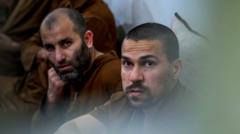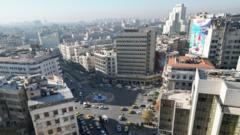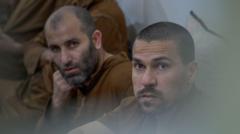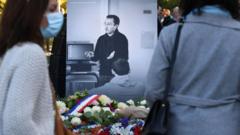The recent incident involving Syria's rebel leader Ahmed al-Sharaa and a photo with a young woman has highlighted deep divisions in the country's sociopolitical landscape, with mixed reactions from liberals and conservatives regarding implications for the future governance in the region.
Controversy Erupts Over Rebel Leader's Photo with Woman in Syria
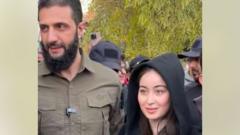
Controversy Erupts Over Rebel Leader's Photo with Woman in Syria
Ahmed al-Sharaa's request for a woman to cover her hair during a photo opportunity has ignited debates on Syria’s future direction amidst polarized views.
In a significant incident that reflects the complexities of Syria’s evolving sociopolitical landscape, Ahmed al-Sharaa, the leader of the Sunni Islamist group Hayat Tahrir al-Sham (HTS), downplayed the uproar surrounding a photo with a young woman, Lea Kheirallah. The controversy arose after videos emerged showing al-Sharaa gesturing to Kheirallah to cover her hair before they took a picture together during his visit to Damascus last week.
The incident has garnered intense backlash from both liberal and conservative commentators, sparking speculation about the future governance of Syria following the rebel group's rise to power. Critics from the liberal camp perceive the request as indicative of potential legislative trends towards an Islamic system, while hardline conservatives have reproached al-Sharaa for even consenting to be photographed with a woman.
In an interview with the BBC, al-Sharaa insisted that Kheirallah’s act of covering her hair was voluntary. "I did not force her. But it's my personal freedom. I want photos taken for me the way that suits me,” he stated. Kheirallah corroborated his account, noting that his request was made in a "gentle and fatherly way" and asserting his right to present himself as he wishes.
The situation has unearthed the challenges any future Syrian leader may face in trying to unite a country that is religiously diverse. Sunni Muslims represent a significant majority of the population, contrasted by various minorities such as Christians and Alawites, each of whom possesses unique cultural identities and political aspirations.
HTS, once an affiliate of al-Qaeda, has previously enacted strict dress codes following its control of Idlib province but has loosened these in recent years, recognizing public discontent. The episode has resonated on social media platforms, raising alarm among many who fear that Syria might pivot toward more conservative, Islamic-centric governance, reminiscent of earlier regulatory measures.
Critique from individuals and journalists ranges widely. Some advocate concerns about “ultra-extremists” finding their way into power, while conservative factions have condemned al-Sharaa for his perceived laxity, inflamed by traditional interpretations of Islamic law regarding mixed-gender associations.
Spheres of discourse are marked by stark tensions, as conservative critics label Kheirallah as a "mutabarijah," vilifying her appearance and questioning al-Sharaa's judgment to engage publicly with her. Online channels have proliferated with calls for stricter adherence to religious codes and accusations that he is seeking popularity amidst unresolved issues in the region, including the treatment of prisoners in HTS-controlled territories.
The discourse surrounding this single incident encapsulates broader fears about potential governance structures in post-Assad Syria and highlights the difficulties in constructing a cohesive political identity in a fractured landscape.









